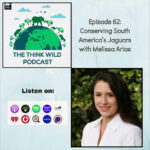
After tigers and lions, the jaguar is the third largest species of wild felid and the only species of the Panthera genus (big cats) to be found in Americas. The current range of jaguars extends from southern USA, across Mexico and Central America to the Amazonian rainforest. In Central and South America, jaguars inhabit tropical rainforests, deciduous and cloud forests. In North America, however, jaguars have shown a preference for seasonally flooded wetlands and dry grasslands.
The jaguar is currently listed as “Vulnerable” by the IUCN Red List following a population decline of 20–25% in about 30 years. Moreover, the jaguar has lost more than half its range since 1999. While deforestation and habitat fragmentation continue to threaten the species, the illegal wildlife trade remains a more pressing issue. Following the Second World War, the international trade of jaguar skis blossomed, with reports of up to 15,000 jaguars being poached annually for the trade from the Brazillian Amazon alone. The international trade of jaguar skins has reportedly plummeted following the enactment of the Convention on International Trade in Endangered Species in 1973. However, poaching and the illegal trade of jaguars still occur on a local scale. Seizure reports indicate that a minimum of 857 jaguars were lost between 2012 and 2018 to the illegal wildlife trade in South America.
In this episode, I speak to Melissa Arias, who has worked extensively to understand and tackle the illegal trade of jaguars. During her PhD at the University of Oxford’s Wildlife Conservation Research Unit, Melissa, scientifically investigated the drives and prevalences of the illegal trade in jaguars in Latin America. Following her PhD, Melissa has worked with various prestigious wildlife organizations, such as the Wildlife Conservation Society, CITES, and the Convention on Migratory Species. She currently is the Coordinator of WWF’s Jaguar and Priority Landscape Project.
Get full access to The Think Wildlife Podcast at anishbanerjee.substack.com/subscribe
